External links
- MLB rule 2 - Definition of fielder's choice
- MLB rule 10.06 - Base hit not scored when... Archived 2006-08-05 at the Wayback Machine
In baseball, fielder's choice (abbreviated FC) refers to a variety of plays involving an offensive player reaching a base due to the defense's attempt to put out another baserunner, or the defensive team's indifference to his advance. Fielder's choice is not called by the umpires on the field of play; rather, it is recorded by the official scorer to account for the offensive player's advance without crediting him with an offensive statistic such as a hit or stolen base.
Though there are several definitions of fielder's choice, the most common (and the only one commonly referred to as FC) involves a fielder fielding a fair ball and choosing to try to put out another baserunner, thereby allowing the batter-runner to safely reach first base. This could be because the defensive player believes (s)he does not have a reasonable prospect of preventing the batter-runner from reaching first base safely, but is usually primarily because it is typically more beneficial for the defensive team to prevent (an)other baserunner(s) from advancing closer to home plate or scoring (a) run(s). If another runner is retired on a force out, the batter will not be rewarded with a hit and will be scored a Fielder's Choice (FC). Other plays that fall under the definition of FC are usually referred to using other terms such as "defensive indifference" or "on the throw."
Fielder's choice is defined in MLB Rule 2, "Definitions", as "the act of a fielder who handles a fair grounder and, instead of throwing to first base to put out the batter-runner, throws to another base in an attempt to put out a preceding runner." FC is recorded for the batter-runner if he reaches first base safely regardless of whether the attempt to put out the other runner(s) is successful. If the other runner is successfully put out for the third out, FC is recorded for the batter-runner regardless of whether he had already reached first base (if the other runner was forced out, the batter is described as grounding into a force play ).
Rule 2 also defines FC as any of the following circumstances:
In many situations fielder's choice requires the official scorer to make judgment calls, such as what the outcome of the play would have been had there been no runners on base after taking into account ordinary effort by the defensive team, as well as what effect any errors committed by the defensive team might have had on the play.
A batter who reaches first base safely as the result of a fielder's choice is not credited with a hit or a time on base; however, his turn at the plate is recorded as an at bat and plate appearance. Therefore, a player's batting average and on-base percentage decrease as a result of reaching first base via fielder's choice.
A batter who reaches first base safely but advances on the same play as the result of fielder's choice is credited with a hit for the number of bases he would have reached safely with no other runners on base, and is said to have taken the additional base(s) on the throw.
A baserunner who makes an undefended steal is not credited with a stolen base, but his advance is accounted for as defensive indifference.

In baseball statistics, a hit, also called a base hit, is credited to a batter when the batter safely reaches or passes first base after hitting the ball into fair territory with neither the benefit of an error nor a fielder's choice.
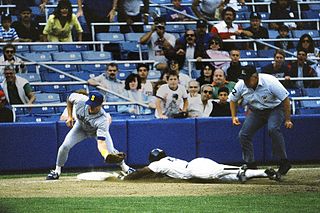
In baseball, a stolen base occurs when a runner advances to a base unaided by other actions and the official scorer rules that the advance should be credited to the action of the runner. The umpires determine whether the runner is safe or out at the next base, but the official scorer rules on the question of credit or blame for the advance under Rule 10 of the MLB's Official Rules.

Softball is a sport similar to baseball, and it is played with a larger ball on a smaller field and with only underhand pitches permitted. Softball is played competitively at club levels, the college level, and the professional level. The game was first created in 1887 in Chicago by George Hancock.
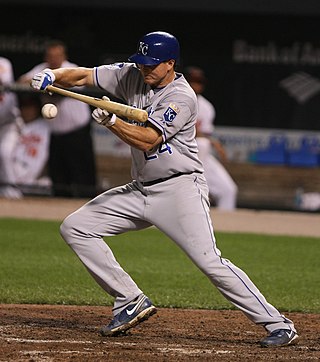
A bunt is a batting technique in baseball or fastpitch softball. Official Baseball Rules define a bunt as follows: "A BUNT is a batted ball not swung at, but intentionally met with the bat and tapped slowly within the infield." To bunt, the batter loosely holds the bat in front of home plate and intentionally taps the ball into play. A properly executed bunt will create weak contact with the ball and/or strategically direct it, forcing the infielders to make a difficult defensive play to record an out.

In baseball and softball statistics, an error is an act, in the judgment of the official scorer, of a fielder misplaying a ball in a manner that allows a batter or baserunner to advance one or more bases or allows a plate appearance to continue after the batter should have been put out. The term error is sometimes used to refer to the play during which an error was committed.

In the game of baseball, the official scorer is a person appointed by the league to record the events on the field, and to send the official scoring record of the game back to the league offices. In addition to recording the events on the field such as the outcome of each plate appearance and the circumstances of any baserunner's advance around the bases, the official scorer is also charged with making judgment calls that do not affect the progress or outcome of the game. Judgment calls are primarily made about errors, unearned runs, fielder's choice, the value of hits in certain situations, and wild pitches, all of which are included in the record compiled. This record is used to compile statistics for each player and team. A box score is a summary of the official scorer's game record.

A first baseman, abbreviated 1B, is the player on a baseball or softball team who fields the area nearest first base, the first of four bases a baserunner must touch in succession to score a run. The first baseman is responsible for the majority of plays made at that base. In the numbering system used to record defensive plays, the first baseman is assigned the number 3.
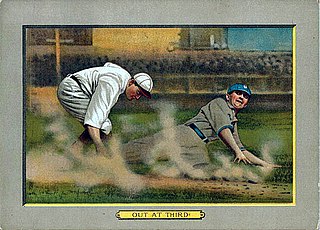
In baseball, an out occurs when the umpire rules a batter or baserunner out. When a batter or runner is out, they lose their ability to score a run and must return to the dugout until their next turn at bat. When three outs are recorded in a half-inning, the batting team's turn expires.
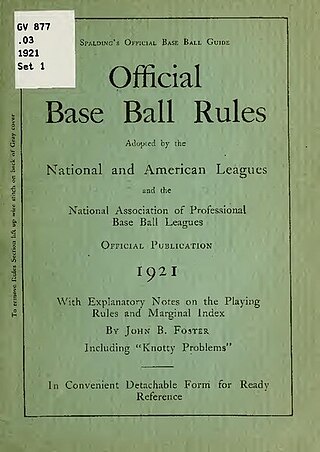
Throughout the history of baseball, the rules have frequently changed as the game continues to evolve. A few common rules most professional leagues have in common is that four balls is a base on balls, three strikes is a strikeout, and three outs end a half-inning.
In baseball, interference occurs in situations in which a person illegally changes the course of play from what is expected. Interference might be committed by players on the offense, players not currently in the game, catchers, umpires, or spectators. Each type of interference is covered differently by the rules.

Baseball scorekeeping is the practice of recording the details of a baseball game as it unfolds. Professional baseball leagues hire official scorers to keep an official record of each game, but many fans keep score as well for their own enjoyment. Scorekeeping is usually done on a printed scorecard and, while official scorers must adhere precisely to one of the few different scorekeeping notations, most fans exercise some amount of creativity and adopt their own symbols and styles.
In baseball, a fourth out is a legal out made by the defense after three outs in a half-inning have already been made. According to the rules, the third out does not cause the ball to become dead; if the fielders make a subsequent out that prevents a run from scoring, this out will supersede the apparent third out, thus becoming the recorded third out. For statistical purposes, the apparent third out is "undone" and the fourth out's result is recorded instead. With the advent of video replay appeals, a new rationale for making extra out(s) has emerged: insurance against a prior out being undone on appeal. These fourth-out situations are not the same as four strikeouts in an inning.
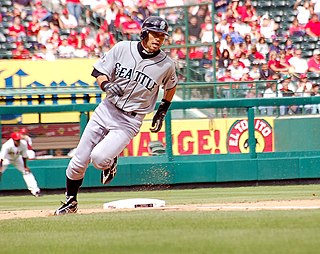
In baseball, base running is the act of running from base to base, performed by members of the team at bat.